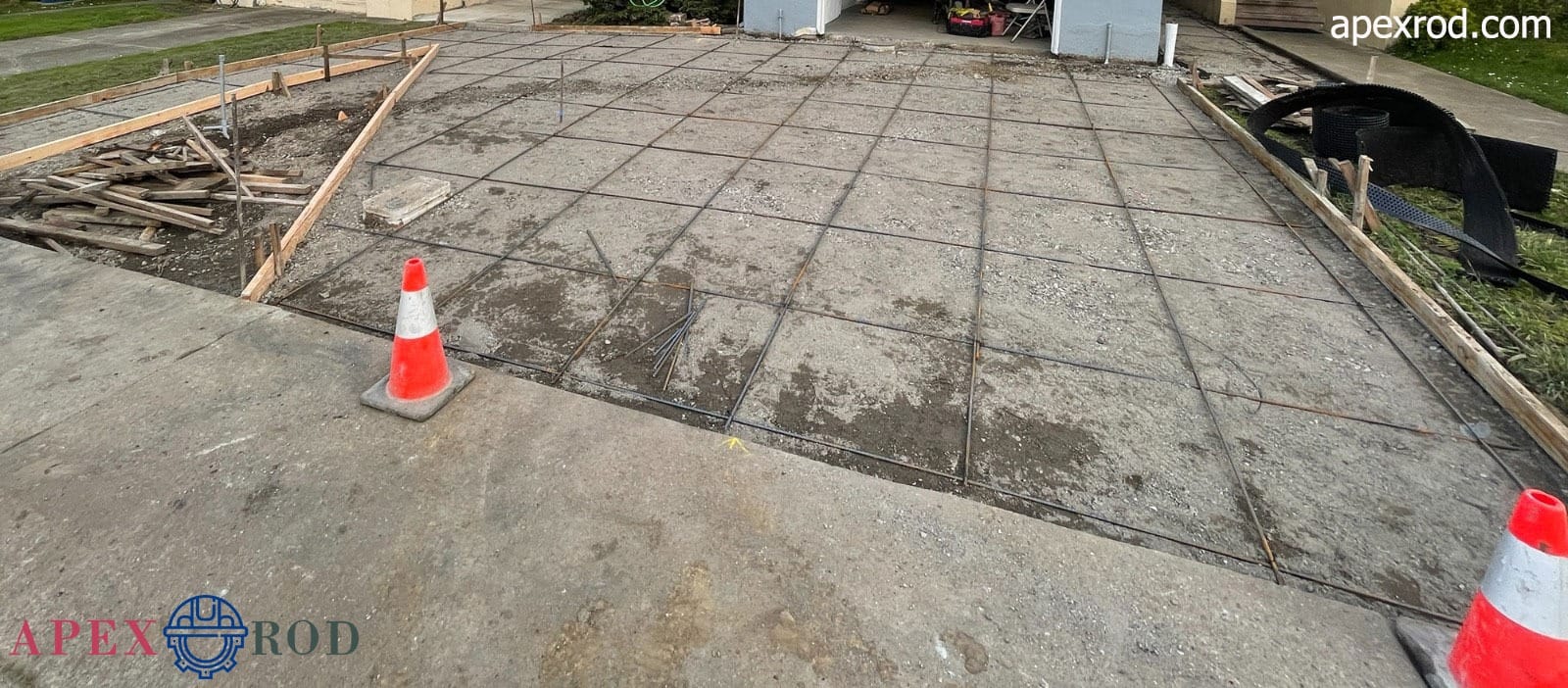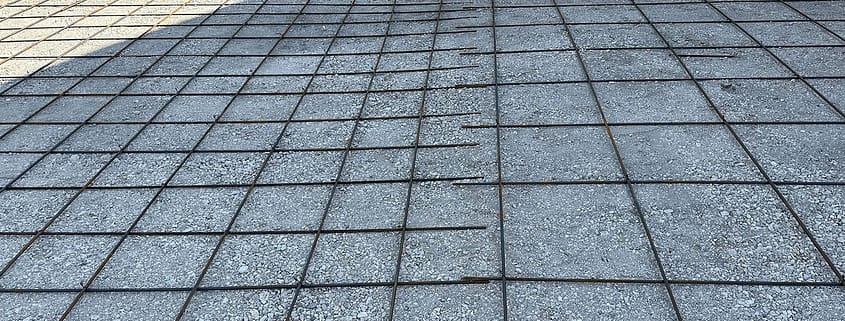Rebar for driveway
Reinforcement bars can be a helpful addition to driveways in regions where the soil is prone to moving. This is because they anchor the concrete slab and protect it from any harm caused by soil movement.
Using rebar is essential for a concrete driveway to ensure strength and prevent potential cracking. Using reinforcing bars increases the strength of a concrete slab, allowing it to withstand large trucks and machines.
When creating a concrete driveway, Apexrod strongly advises consulting with an expert. In this piece, we will review the principles of reinforcing bars and answer commonly asked questions about their use in concrete driveways.
Using Rebar For Concrete Stability
Rebar is made of steel and has been used to reinforce concrete structures for over 150 years. Reinforcement steel is a carbon steel bar used to strengthen concrete constructions. It is also known as steel rebar or reinforcing steel. It is frequently used in construction to improve and stabilize the structure.
Rebar is used in concrete driveways to bond the material and prevent compression. It is often constructed in a lattice-like pattern and is placed by concrete workers while making a concrete driveway.
When Do You Need Rebar in a Concrete Driveway?
Concrete driveways usually require rebar or reinforcing steel. Using steel in your driveway guarantees:
• It can withstand enormous loads.
• Its proportions warrant reinforcement.
• Driveways prone to accommodate big cars or regular use can benefit from the extra rebar support.
• It is built on shifting or sinking ground.
• Concrete driveways can benefit from rebar if they are located where the soil moves or settles regularly.
Rebar Types for Concrete Driveways
Driveway rebar comes in standard, stainless steel, galvanized, and epoxy-coated varieties.
Most household driveways utilize standard rebar, which is comprised of carbon steel. Meanwhile, due to its anti-corrosion features, stainless steel rebar is quite expensive and, as a result, is not suggested for home usage due to its high cost.
Finally, galvanized and epoxy-coated rebar are metal rods that are more corrosion-resistant and are designed to function better in harsh environments.

Why Is Rebar Needed for Concrete?
The majority of concrete requires some form of reinforcing. But why?
While concrete is highly robust in certain aspects, it also has a few fatal flaws. To comprehend these flaws, we must first understand the many forms of stress that can be applied to objects.
1. Compressive pressure
Compressive stress is a force applied to an item that shortens or compresses it. For example, if an elephant treads on your toe, you will suffer compressive stress.
2. Shear stress
When forces are applied perpendicularly to one another, shear stress arises. Shear tension occurs when you lock your fingers together and pull against yourself.
3. Tensile stress
Tensile stress is a force that causes an item to extend or stretch. Tensile force is applied to the rope when you swing on a rope swing and leap into a swimming hole.
Concrete is solid under compressive and shear stress yet fails miserably under tensile stress. Concrete’s tensile strength is only around 10-15% of its compressive strength. Rebar is generally used to improve the tensile strength of concrete.
What Happens If I Don’t Put Rebar in My Concrete Driveway?
The absence of rebar in a concrete driveway that requires it results in a weak and unstable surface prone to fracture. Water can readily enter the concrete as a result of such deterioration. Water beneath the concrete slab might cause damage to the building over time.
The good news is that rebar can help avoid this. The additional reinforcement can create a sturdy and long-lasting surface for your driveway.
Furthermore, soil movement can cause problems with concrete driveways, but rebar installation can keep the concrete together and prevent it from splitting. You can find out how long concrete driveways endure by reading this page.
Concrete Driveway Construction Details
Rebar is best utilized in driveways that can hold 5-6 inches of concrete. This is because rebar is thicker than galvanized mesh reinforcement. The appropriate approach to lay rebar reinforcement is in the middle or slightly above the centre of the slab’s thickness. Concrete contractors achieve this by propping up the rebar grids on particular metal or plastic supports known as “chairs.”
It is also feasible to utilize bricks and other scrap materials as supports. However, this can result in weak points in the slab. Rebar grids are built by putting the bar in a perpendicular pattern with uniform spacing. Metal wire is used to connect the bars at each junction. The grid’s margins should be kept at identical distances from all sides of the slab, and the slab’s concrete covering should be kept to a minimum throughout.
A concrete driveway should be robust enough to support the vehicles that can drive over it. The concrete driveway should be built in such a way that it increases the lifetime of your home.
How Thick Should A Reinforced Concrete Driveway Be
Concrete driveway slabs are typically 4 inches thick but can be 6 inches wide to support big trucks and other heavy vehicle usage.
Inside, the slab should have some form of reinforcement. Rebar for driveway is a standard construction reinforcing material.
Wire Mesh Vs Rebar For Driveway
Choosing between wire mesh and rebar for a driveway involves considering project requirements, cost, and specific needs. Both wire mesh and rebar are reinforcement materials used in concrete to enhance strength and durability.
Wire mesh for concrete driveways
Concrete slabs are highly prone to cracking, and rebar for driveways helps minimize crack expansion as broken slabs move apart. Welded wire mesh is a viable alternative for rebar for driveway strengthening. The mesh is made up of galvanized welded wire panels. Heavy gauge welded wire mesh panels reinforce driveways not frequently used by large vehicles such as construction vehicles or industrial trucks.
Mesh is commonly used by contractors who create 4-inch-thick driveway concrete since it is a finer reinforcement and less expensive than rebar.
For reinforcement, a 3/8-inch diameter number three rebar should be used when pouring a thicker driveway.
Rebar for driveway
In a driveway with 5-6 inches of concrete, rebar will be highly effective. Because rebar is thicker than galvanized mesh reinforcement, this is the case. To install rebar reinforcement correctly, ensure it is put in the centre or slightly above the centre of the slab’s thickness.
Metal wire holds the bars together at each juncture. The grid’s boundaries should have remained at the same spacing from all sides of the slab, and the minimum concrete covering should be maintained throughout the slab.
You can visit the Apexrod website or contact us to purchase or inquire about rebar prices.



Leave a Reply
Want to join the discussion?Feel free to contribute!